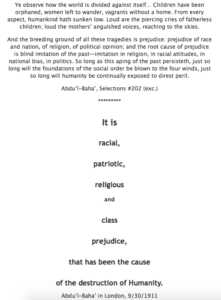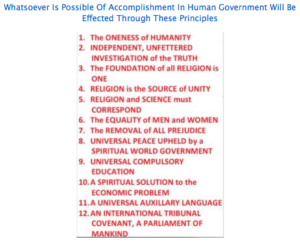QUESTIONS/ TO CARRY ON…
(a) Will “we the people” of the US demonstrate that our “Great Society” has NOW come of age: as an all inclusive society–by AMENDing the Constitution of the United States to REPEAL THE ELECTORAL COLLEGE?
(b) Will the Western States of the Rocky Mountains be the first States to pass that AMENDMENT into Law? And begin that type of FORWARD momentum channeling the energies of a world-wide march for justice–into a REAL structural change in the US?
(c) IF ASKED: Would Biden ? or Trump? SUPPORT the ELIMINATION OF THE ENTIRE ELECTORAL COLLEGE? Or would BOTH say “Keep it?” Doesn’t the public “we the people” have a right to know the policies of our own elected officials on this ALL-important issue?
(d) Are “we the people” really “the unwashed masses” who need overlords from outworn institutions such as how to select the Emperor of the Holy Roman Empire or as the College of Cardinal’s select the Papa? (see for FACTs )below).
(e) Will the US Government return POWER and AUTHORITY back to the Governors and Mayors (elected by the people) that was stripped away after WW II?
(f) And yet another question: Do we really need (or want) an AMERICAN INSTITUTION (THE ELECTORAL COLLEGE) that is the TOP Source of DEFINING other human beings (in OUR OWN ELECTION of the Federated head of the Country–the commander and chief– representing us all to every other nation as 3/5th of a person?
“After the initial estimates agreed to in the original Constitution, Congressional and Electoral College reapportionment was made according to a decennial census to reflect population changes, modified by counting three-fifths of slaves.” (see for more FACTS below).
GET RID OF SYSTEMIC RACISM IN AMERICA? GET RID OF THE ELECTORAL COLLEGE? LET THE PEOPLE GOVERN THEMSELVES in their OWN Jurisdictions!!!
Election expert, William C. Kimberling, reflected on the original intent as follows:
“The function of the College of Electors in choosing the president can be likened to that in the Roman Catholic Church of the College of Cardinals selecting the Pope. The original idea was for the most knowledgeable and informed individuals from each State to select the president based solely on merit and without regard to State of origin or political party.”
Furthermore, the original intention of the framers was that the Electors would not feel bound to support any particular candidate, but would vote their conscience, free of external pressure. Supreme Court Associate Justice Robert H. Jackson wrote:
“No one faithful to our history can deny that the plan originally contemplated, what is implicit in its text, that electors would be free agents, to exercise an independent and nonpartisan judgment as to the men best qualified for the Nation’s highest offices.”
Article II, Section 1, Clause 2 of the Constitution states:
Each State shall appoint, in such Manner as the Legislature thereof may direct, a Number of Electors, equal to the whole Number of Senators and Representatives to which the State may be entitled in the Congress: but no Senator or Representative, or Person holding an Office of Trust or Profit under the United States, shall be appointed an Elector.
In Federalist No. 68 Alexander Hamilton described the Founding Fathers’ view of how electors would be chosen:
A small number of persons, selected by their fellow-citizens from the general mass, will be most likely to possess the information and discernment requisite to such complicated [tasks]… They have not made the appointment of the President to depend on any preexisting bodies of men who might be tampered with beforehand to prostitute their votes [i.e., to be told how to vote]; but they have referred it in the first instance to an immediate act of the people of America, to be exerted in the choice of persons [Electors to the Electoral College] for the temporary and sole purpose of making the appointment. And they have EXCLUDED from eligibility to this trust, all those who from situation might be suspected of too great devotion to the President in office [in other words, no one can be an Elector who is prejudiced toward the president]… Thus without corrupting the body of the people, the immediate agents in the election will at least enter upon the task free from any sinister bias [Electors must not come to the Electoral College with bias]. Their transient existence, and their detached [unbiased] situation, already taken notice of, afford a satisfactory prospect of their continuing so, to the conclusion of it.”
Three-fifths clause and the role of slavery
After the initial estimates agreed to in the original Constitution, Congressional and Electoral College reapportionment was made according to a decennial census to reflect population changes, modified by counting three-fifths of slaves. On this basis after the first census, the Electoral College still gave the free men of slave-owning states (but never slaves) extra power (Electors) based on a count of these disenfranchised people, in the choice of the U.S. president.
At the Constitutional Convention, the College composition in theory amounted to 49 votes for northern states (in the process of abolishing slavery) and 42 for slave-holding states (including Delaware). In the event, the first (i.e. 1788) presidential election lacked votes and electors for unratified Rhode Island (3) and North Carolina (7) and for New York (8) which reported too late; the Northern majority was 38 to 35. For the next two decades the three-fifths clause led to electors of free-soil Northern states numbering 8% and 11% more than Southern states. The latter had, in the compromise, relinquished counting two-fifths of their slaves and, after 1810, were outnumbered by 15.4% to 23.2%.
While House members for Southern states were boosted by an average of 1⁄3, a free-soil majority in the College maintained over this early republic and Antebellum period. Scholars further conclude that the three-fifths clause had low impact on sectional proportions and factional strength, until denying the North a pronounced supermajority, as to the Northern, federal inititive to abolish slavery. The seats that the South gained from such “slave bonus” were quite evenly distributed between the parties. In the First Party System (1795–1823), the Jefferson Republicans gained 1.1 percent more adherents from the slave bonus, while the Federalists lost the same proportion. At the Second Party System (1823–1837) the emerging Jacksonians gained just 0.7% more seats, versus the opposition loss of 1.6%.
The three-fifths slave-count rule is associated with three or four outcomes, 1792–1860:
• The clause, having reduced the South’s power, led to John Adams’s win in 1796 over Thomas Jefferson.
• In 1800, historian Garry Wills argues, Jefferson’s victory over Adams was due to the slave bonus count in the Electoral College as Adams would have won if citizens’ votes were used for each state. However, historian Sean Wilentz points out that Jefferson’s purported “slave advantage” ignores an offset by electoral manipulation by anti-Jefferson forces in Pennsylvania. Wilentz concludes that it is a myth to say that the Electoral College was a pro-slavery ploy.
• In 1824, the presidential selection was passed to the House of Representatives, and John Quincy Adams was chosen over Andrew Jackson, who won fewer citizens’ votes. Then Jackson won in 1828, but would have lost if the College were citizen-only apportionment. Scholars conclude that in the 1828 race, Jackson benefited materially from the Three-fifths clause by providing his margin of victory.
The first “Jeffersonian” and “Jacksonian” victories were of great importance as they ushered in sustained party majorities of several Congresses and presidential party eras.
Besides the Constitution prohibiting Congress from regulating foreign or domestic slave trade before 1808 and a duty on states to return escaped “persons held to service”,] legal scholar Akhil Reed Amar argues that the College was originally advocated by slaveholders as a bulwark to prop up slavery. In the Congressional apportionment provided in the text of the Constitution with its Three-Fifths Compromise estimate, “Virginia emerged as the big winner [with] more than a quarter of the [votes] needed to win an election in the first round [for Washington’s first presidential election in 1788].” Following the 1790 census, the most populous state in the 1790 Census was Virginia, with 39.1% slaves, or 292,315 counted three-fifths, to yield a calculated number of 175,389 for congressional apportionment. “The “free” state of Pennsylvania had 10% more free persons than Virginia but got 20% fewer electoral votes.” Pennsylvania split eight to seven for Jefferson, favoring Jefferson with a majority of 53% in a state with 0.1% slave population. Historian Eric Foner agrees the Constitution’s Three-Fifths Compromise gave protection to slavery.
Supporters of the College have provided many counterarguments to the charges that it defended slavery. Abraham Lincoln, the president who helped abolish slavery, won a College majority in 1860 despite winning 39.8% of citizen’s votes. This, however, was a clear plurality of a popular vote divided among four main candidates.
Benner notes that Jefferson’s first margin of victory would have been wider had the entire slave population been counted on a per capita basis. He also notes that some of the most vociferous critics of a national popular vote at the constitutional convention were delegates from free states, including Gouverneur Morris of Pennsylvania, who declared that such a system would lead to a “great evil of cabal and corruption,” and Elbridge Gerry of Massachusetts, who called a national popular vote “radically vicious”. Delegates Oliver Ellsworth and Roger Sherman of Connecticut, a state which had adopted a gradual emancipation law three years earlier, also criticized a national popular vote. Of like view was Charles Cotesworth Pinckney, a member of Adams’ Federalist Party, presidential candidate in 1800. He hailed from South Carolina and was a slaveholder. In 1824, Andrew Jackson, a slaveholder from Tennessee, was similarly defeated by John Quincy Adams, a strong critic of slavery.
NOW THAT THE PEOPLE “have suggested” [“voted?”] who they would prefer to be president: What will the open envelope say on JAN 6, 2021?
Keep the electoral college–get rid of it?–the choice is OURS!
“If the people are spiritual any system will work. If they are not spiritual no system will work. That includes the Baha’i system.”–‘Abdu’l-Baha.
************

